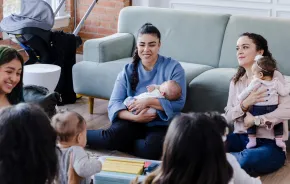 A few years ago, my 10-year-old daughter and her friend negotiated a friendship disagreement as I watched from far away. Afterward, I took a short walk with her and asked my daughter what her friend had said.
A few years ago, my 10-year-old daughter and her friend negotiated a friendship disagreement as I watched from far away. Afterward, I took a short walk with her and asked my daughter what her friend had said.
“She asked me to not be so loud,” replied my fourth-grade girl.
I laughed before I spoke my reply. But there was hurt in my cackle. You see, I was a loud girl, too, and I recall the misery my brashness caused me long ago.
I was unquiet, opinionated. Talking was my skill and my blessing, and the more I felt, the louder my voice became. I felt a lot. I recall there was always a group of girls that didn’t mind my ways. In fact, I recall my mom telling me one of my friends liked how stubborn I was; the way I always held out for the Barbie I wanted earned her admiration.
Still, there was a whole swath of females who did not appreciate my voice, which was both loud in volume and loud because it was unsolicited, my opinions flying out whenever and wherever they pleased, forte. When we voted in sixth grade for that end of elementary school “best of” list, a popular girl named Nan told me I could have the banner of “Most Intelligent Girl”; she did not want it. Her retort stung because I so wanted to fit in and be a popular girl. I can still see the note I unfolded in fifth grade that listed me as the sender’s No. 1 enemy.
Maybe today we’d call those girls mean girls — then we didn’t have a shorthand name for them backed by bestseller books and social-emotional theory. But it’s really our long-established cultural code that teaches girls how to be covertly mean while appearing kind and nice on the surface.
“Up until about third grade, girls are given permission to speak: I love that, I hate that,” says Dr. Catherine Steiner-Adair, Ed.D., clinical psychologist, school consultant, speaker and author. “A girl at age 9 or 10 comes home and says, ‘I hate, Samantha,’ and she hears, ‘Oh honey you can’t hate her.’ They hear if I tell someone I am mad or upset directly, it is going to destroy the friendship. They get into covert actions. Instead of saying I am mad to Sam, she tells her friends what a bitch Samantha is.”
I do know my need to fit in was quelled by my need to speak out, and I continued to be a loud girl — in both volume and proffered opinion — all the way into the now. But I also know I really could have used some help back then in learning how to use my voice.
“Girls need enormous help in learning that there is a difference in being passive aggressive and uber aggressive and in being direct and assertive. If they don’t learn how to be direct and assertive, it undermines their ability it undermines their ability to lead,” says Steiner-Adair, who developed the highly acclaimed middle school program and book Full of Ourselves: A Wellness Program to Advance Girl Power, Health, and Leadership.
Maybe if I had more guidance, I wouldn’t have offended the people closest to me when I couldn’t stop brandishing my opinions with too much volume. I don’t’ recall what I was spouting about one evening while hanging out with friends, but I do remember how one of them was tired of my passion about my view point, how I gave no one else room to respond. Finally she asked me to give my opinion to her dog, could I please shut-up!
I think about all of this as I raise my own two girls. How do I teach my daughters to speak up yet be respectful and to find friends that let them be fully themselves? I know I have experienced much wounding thanks to my loud voice. I always had to speak up, but sometimes my volume and feelings buried what could have been a dialogue between friends. I also lacked the self-confidence to think I could be loved exactly as I was; a solid self-esteem would have made my path easier. I walk a fine line as teach my girls to love themselves and to be respectful of others’ opinions and needs while not losing the right to speak out loud. How do I counter-act the cultural message that pits girls against girls?
“You raise a non-cultural dominant girl. There are social consequences if you stay true to yourself and there are psychological consequences to not staying true to yourself,” Steiner-Adair says. She suggests enrolling girls in programs such as Girls Inc. and Girls on the Run or good camps for girls, supporting them as they dive into activities they really like to do, making sure our daughters are not too isolated or lonely, and doing many activities together as a family.
Steiner-Adair’s words help so much with my quest to thoughtfully parent my daughters. I think back to my reply to my oldest girl when her friend asked her to quiet down; I think I did OK.
“You know, you don’t need to quiet down. There will be people who like you for exactly who you are. You get to decide how you want to act,” I said.
I know I added our family saying to our discussion, too: You have to be kind. I want to help her find the middle ground, to speak with assertiveness without being overly aggressive. But first I reminded her that her loud voice is a voice I will always love, and there will always be people on this planet who want to hear her speak even if her volume is occasionally a tad too loud.











